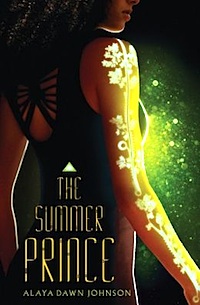The Summer Prince by Alaya Dawn Johnson (Arthur A. Levine, 2013) is the last finalist from last year’s Tiptree Award that I’m going to talk about in this column—and I’ve just squeaked it in under the 2014 wire, I think. (Shamefully, I doubt I’m going to get to read N.A. Sulway’s winning Rupetta before the next set of finalists are announced.)
And, wow.
It’s easy to see why The Summer Prince has received a significant amount of acclaim. This is a tight, compelling book with an awful lot of things to say about art, about politics, about principles and compromises, about the prices people have to pay to make a difference, and about power and inequality. At less than 300 pages long, it’s a very compact story: it’s also incredibly effective.
Palmares Três is a city in what was once Brazil. A city with very little traffic with outsiders since the series of catastrophes that changed the world, but a city built on tradition as much as technology; a city ruled by the Aunties, and by a Queen who is chosen at regular intervals by the Summer King at the moment of his death.
June Costa is an ambitious teenaged artist (with an unhappy relationship with her mother) in a city inhabited by people who can live well into their third century. Along with the rest of the city’s youth, she falls in love with Enki, the new Summer King. Unlike most of the rest of the city, she and her best friend Gil have the opportunity to meet the Summer King in person. And while Gil falls hard for Enki, June sees in him something more than a beautiful boy who’ll die before the year is out. She sees in him a fellow artist, a potential partner for projects than will shake the city. But art and politics and closely intertwined, and by collaborating with Enki, June finds herself at the centre of forces and events she can’t control.
And worse, for her, is the fact that she’s falling hard for Enki herself… and time is running out.
In many ways, the setting of The Summer Prince reminds me of some of the feminist SF of the 1970s: Palmares Três is essentially a city ruled by women, a city whose systems work reasonably well for the majority of its citizens. It also reminds me of some of the more recent YA dystopias, although Palmares Três is no more dystopian than many of our own modern states: the young people are relatively disenfranchised, and there is, as ever, an oppressed and exploited underclass. These elements combine to gives us a science fictional city that feels very much like a real place, inhabited by real people, but run along lines rather different to those most of us are used to.
This gives the mythic resonance of Johnson’s work—the institution of the Summer King in Palmares Três has strong parallels with James Frazer’s idea of sacred kingship, for example, and Enki is also the name of a god of water, fertility, and replenishment in Sumerian mythology who shapes humanity out of clay and the blood of a slain god—an even greater force.
It’s a powerful, deeply affecting book. It doesn’t pull its punches. Fluently written and elegantly put together, it’s an absolute joy to read. I’m not sufficiently articulate lately* to express just how well it’s put together: insert pleased and happy hand gestures here. I probably wouldn’t have read it any time soon had it not been a Tiptree finalist, but having read it, I’m really glad I did. I can wholeheartedly recommend it to anyone looking for a cracking good read.
*I blame headcolds. And cold medicine.
Liz Bourke is a cranky person who reads books. Her blog. Her Twitter.










